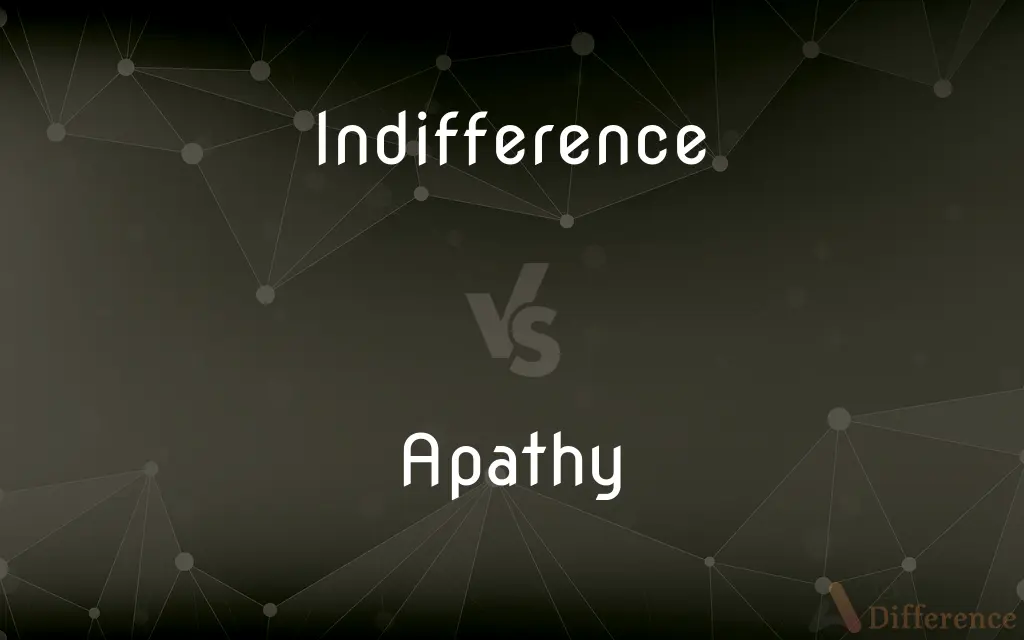Indifference vs. Apathy — What's the Difference?
By Urooj Arif & Maham Liaqat — Updated on March 13, 2024
Indifference denotes a lack of preference or interest, suggesting neutrality, whereas apathy implies a deeper lack of concern, emotion, or passion, often signifying disengagement.

Difference Between Indifference and Apathy
Table of Contents
ADVERTISEMENT
Key Differences
Indifference might be seen in situations where an individual simply does not have a strong opinion or preference between options, reflecting a neutral stance. Apathy, on the other hand, reflects a more profound disconnection or lack of interest, often pointing to an underlying disengagement or demotivation.
While indifference can be a temporary state or limited to specific contexts, apathy suggests a more pervasive or chronic lack of interest that can affect various aspects of life, indicating a deeper issue.
Indifference can sometimes be a strategic or protective stance, avoiding conflict or emotional investment, whereas apathy often results from disillusionment, fatigue, or a sense of helplessness, leading to disengagement.
In social and interpersonal contexts, indifference may be perceived as a lack of preference or concern, potentially less harmful than apathy, which can be seen as a failure to engage or empathize, possibly leading to neglect or isolation.
Comparison Chart
Definition
Lack of preference or interest, implying neutrality.
Lack of concern, emotion, or passion, indicating disengagement.
ADVERTISEMENT
Context
Can be specific and temporary, reflecting a neutral stance.
More pervasive and possibly chronic, reflecting a deeper disconnection.
Implications
Might be strategic or protective, avoiding emotional investment.
Often results from disillusionment or fatigue, leading to disengagement.
Perception
May be seen as less harmful, indicating neutrality.
Viewed negatively, as it suggests a failure to engage or empathize.
Impact
Can lead to avoidance of conflict or emotional investment.
Can result in neglect, isolation, or a lack of participation in life.
Compare with Definitions
Indifference
The state of having no particular interest or concern; apathy.
His indifference to the issue was apparent in the meeting.
Apathy
A state of lacking interest, enthusiasm, or concern; emotional numbness.
Apathy towards political issues is concerning among young voters.
Indifference
Exhibiting neither a positive nor negative stance toward a subject.
She maintained an air of indifference during the debate.
Apathy
Withdrawing from participation or interest in activities or issues.
His apathy towards social events made him a recluse.
Indifference
Keeping an emotional distance from issues or people.
Her indifference towards the project was clear from her lack of input.
Apathy
Having little or no desire to take action or exert effort.
Apathy in students often results in poor academic performance.
Indifference
A state of emotional or intellectual detachment.
Indifference kept him from getting too involved in the argument.
Apathy
A lack of emotional response or feeling.
The constant negativity in the news led to a sense of apathy.
Indifference
Having no strong inclination towards one option over another.
His indifference to the menu left the choice entirely up to us.
Apathy
Showing little or no reaction to what might typically elicit a response.
She showed apathy even towards her favorite activities.
Indifference
Lack of interest, concern, or sympathy
She shrugged, feigning indifference
Apathy
Apathy is a lack of feeling, emotion, interest, or concern about something. It is a state of indifference, or the suppression of emotions such as concern, excitement, motivation, or passion.
Indifference
Mediocrity
The indifference of Chelsea's midfield
Apathy
Lack of interest or concern, especially regarding matters of general importance or appeal; indifference.
Indifference
The state or quality of being indifferent.
Apathy
Lack of emotion or feeling; impassiveness.
Indifference
The state of being indifferent.
Apathy
Lack of emotion or motivation; lack of interest or enthusiasm towards something; disinterest (in something).
Indifference
Unbiased impartiality.
Apathy
Want of feeling; privation of passion, emotion, or excitement; dispassion; - applied either to the body or the mind. As applied to the mind, it is a calmness, indolence, or state of indifference, incapable of being ruffled or roused to active interest or exertion by pleasure, pain, or passion.
A certain apathy or sluggishness in his nature which led him . . . to leave events to take their own course.
According to the Stoics, apathy meant the extinction of the passions by the ascendency of reason.
Indifference
A lack of enthusiasm.
Apathy
An absence of emotion or enthusiasm
Indifference
Unconcerned nonchalance.
Apathy
The trait of lacking enthusiasm for or interest in things generally
Indifference
(philosophy) Self-identity defined through the negation of difference, non-difference.
Indifference
The quality or state of being indifferent, or not making a difference; lack of sufficient importance to constitute a difference; absence of weight; insignificance.
Indifference
Passableness; mediocrity.
Indifference
Impartiality; freedom from prejudice, prepossession, or bias.
He . . . is far from such indifference and equity as ought and must be in judges which he saith I assign.
Indifference
Absence of anxiety or interest in respect to what is presented to the mind; unconcernedness; as, entire indifference to all that occurs.
Indifference can not but be criminal, when it is conversant about objects which are so far from being of an indifferent nature, that they are highest importance.
Indifference
Unbiased impartial unconcern
Indifference
Apathy demonstrated by an absence of emotional reactions
Indifference
The trait of lacking enthusiasm for or interest in things generally
Indifference
The trait of remaining calm and seeming not to care; a casual lack of concern
Common Curiosities
What are the consequences of apathy?
Apathy can lead to neglect of personal responsibilities, isolation from social activities, and a general lack of participation in life.
How can apathy be addressed?
Addressing underlying causes, such as depression or burnout, through therapy, lifestyle changes, or engaging in meaningful activities, can help mitigate apathy.
What causes indifference?
Indifference can result from various factors, including overload of choices, emotional defense mechanisms, or simply a lack of interest in the matter at hand.
How can one overcome apathy?
Identifying passions, setting small achievable goals, and seeking support from friends, family, or professionals can help overcome apathy.
Can indifference be positive?
In some situations, indifference can help maintain neutrality or emotional distance, potentially protecting an individual from conflict or distress.
Is it normal to feel indifferent occasionally?
Yes, feeling indifferent about certain decisions or situations is a normal part of human experience, especially when the outcomes are perceived as having minimal impact.
Does apathy affect relationships?
Yes, apathy can strain relationships, as it may lead to a lack of emotional engagement, communication, and empathy towards others.
Can societal issues lead to apathy?
Yes, widespread issues like political disillusionment or societal injustices can contribute to a collective sense of apathy among individuals or groups.
Can apathy be temporary?
Apathy can be a temporary response to specific situations, like burnout, but may become chronic if not addressed.
Can indifference be a coping mechanism?
Indifference can serve as a coping mechanism to avoid emotional pain, conflict, or decision-making stress, especially in overwhelming situations.
Are indifference and apathy the same in terms of emotional impact?
While both involve a lack of strong emotions towards something, apathy usually has a more profound negative emotional impact, indicating deeper issues.
Is there a link between apathy and mental health?
Apathy can be both a symptom and a cause of certain mental health issues, such as depression or anxiety disorders.
How does one differentiate between indifference and just being calm?
Indifference involves a lack of interest or concern, whereas being calm refers to an emotional state of peace and tranquility, possibly even amidst interest or concern.
How does indifference manifest in decision-making?
Indifference in decision-making can manifest as a lack of preference, leading to delayed decisions or deferment to others' choices.
Does apathy always imply a negative outlook?
While often associated with a negative outlook, apathy can also stem from feeling overwhelmed or desensitized, rather than outright negativity.
Share Your Discovery

Previous Comparison
Sad vs. Angry
Next Comparison
Fret vs. WorryAuthor Spotlight
Written by
Urooj ArifUrooj is a skilled content writer at Ask Difference, known for her exceptional ability to simplify complex topics into engaging and informative content. With a passion for research and a flair for clear, concise writing, she consistently delivers articles that resonate with our diverse audience.
Co-written by
Maham Liaqat















































